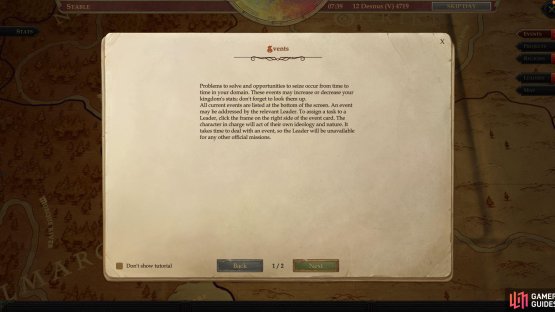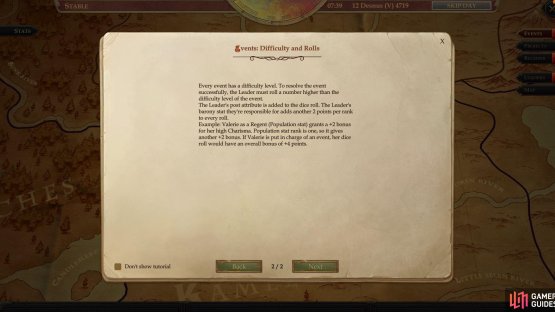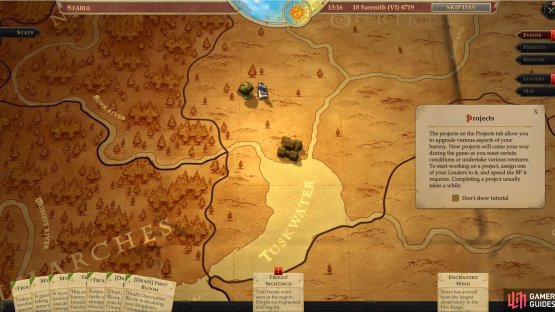Now that leaders have been discussed, turn your attention to the other tabs along the right end of the screens: Events, Projects, Regions, and Map. These may have been mentioned a bit earlier when discussing leaders, but now it’s time to go over them in a bit more detail.
(1 of 2) Events offer challenges to overcome and opportunities to help establish your kingdom
Events offer challenges to overcome and opportunities to help establish your kingdom (left), however, they are not without difficulty. (right)
Events are random occurrences that you can attempt to exploit for your benefit (Opportunities), or that you must resolve lest you face some detrimental consequences (Problems). Individual events are represented by cards at the bottom of the screen, and many of them are random, appearing as time progresses. This gives you incentive to check your kingdom screen regularly and assign Leaders to oversee them, which you can fortunately do even when you’re away from Tuskdale. Succeeding at these events is one of the primary goals of a Leader, as doing so will either mitigate a penalty incurred by the event, or reward you for exploiting an opportunity. The currency of event cards is usually kingdom stats.
To handle an event you’ll need to click on the event card and assign a Leader to the task. The Leader(s) available will vary depending on the nature of the event, and they’ll make a skill check in a relevant kingdom-related field to determine success or failure of the endeavor. Fortunately, while a Leader is deployed on an event or project, they can still adventure with you (don’t ask why, just take the gift and be glad).
Sometimes you’ll get to choose which Leader you wish to deal with an event or problem, and this reflects the nature of your response. If you send your Regent, for example, the response is understood to be a diplomatic one, while sending your General is a military response. The nature of your response can influence the difficulty of the task, as well as the reward, and it’s not uncommon for the reward to reflect the kingdom stat the selected leader represents - succeeding at a task with your High Priest will typically boost your kingdom’s Divine stat, for instance.
While some event cards are random and will appear of their own volition (sometimes repeating several times - turns out religious festivals and bandit attacks aren’t always one-time affairs) others appear in response to specific events. Some quests may have events associated with them often being introduced by a stranger visiting your throne room and telling you about the problem (quest) they need you to resolve. Other time specific quest objectives - often optional - can be resolved via an event card. Event cards can also appear to reflect minor opportunities and problems that arise based on your actions and interactions with others.
By far the most important event cards, however, are the ones that accompany main quests. These frequently take the aforementioned role of introducing a quest to you, but they can also serve as… motivation for you to resolve the next main storyline quest. Main quests are usually centered around something that’s a vital threat to the stability of your kingdom, and while the time you have to resolve these quests is usually generous (and usually measured in weeks, if not months), the time available can also be rather variable. The longer a main quest-related threat endures, the more damage it will cause, lowering your kingdom stats to reflect the loss of life, trade, stability and loyalty inflicted by these hardships. Ignoring the problem entirely will cause the situation to deteriorate faster, but you can often send leaders to deal with event cards related to the quest, mitigating its effects and buying you more time, albeit at the cost of your leader’s time and always subject to the risk of failure. This will be covered in more detail when it occurs.
(1 of 2) Projects often appear as a way to show support for one of your leaders in their ambitions.
Projects often appear as a way to show support for one of your leaders in their ambitions. (left), Regions can be claimed to expand your barony once their conditions have been met. (right)
Projects are generally longer-term than Events, giving you more time to deal with them. Otherwise they’re very similar, often requiring the investment of one of your leader’s time and/or some material resources. Select them via the cards at the bottom of the screen, which will appear when the Projects tab is selected.
Map allows you to get a wider view of the area, from which you can select various icons representing events or settlements.
Not much to say here, you can use this to take a gander at the map and scheme above regions you don’t yet control.








No Comments